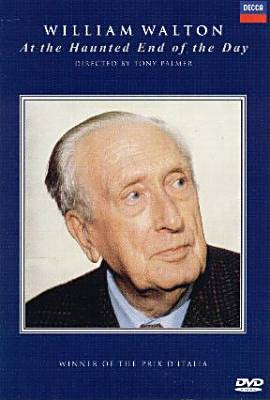DVD: WILLIAM WALTON
At the Haunted End of the Day
London Weekend Television's South Bank Show 1981 documentary
Directed by Tony Palmer featuring Sir William Walton and Lady Susana Walton and comments by Sir Laurence Olivier, and Sacheverell Sitwell. With film excerpts from: The First of the Few; Battle of Britain; Hamlet; Henry V
And concert pieces
DECCA DVD 074 1590-9 [99mins]
This DVD comes in an all-regions NTSC which means that you should ensure that your DVD player and TV are PAL/NTSC compatible ("dual-standard").

This wonderful documentary has to be Tony Palmer's masterpiece. I remember, with great pleasure, its first screening in 1981 (two years before the composer's death) in an unprecedented 90 minute span on British commercial TV with just two short commercial breaks. One cannot imagine that sort of indulgence in today's dumbing-down, ratings-mad atmosphere!
Palmer wisely steps back and allows Sir William and Lady Susana Walton to tell the story of the composer's life and times and music, together with astute observations from Sacheverell Sitwell and, especially, of Sir Laurence Olivier. Olivier comments that the music is sexy and strongly affirmative about love – no wonder that Walton wrote so much thrillingly effective music for films (John Williams has commented that he is held in great veneration by the Hollywood film music fraternity).
Palmer's film traces Walton's life story beginning with his humble beginnings in Bolton Lancashire, a place he swore he would never return to after being bullied at the Oxford choir school because of his accent. His talent for composition was soon recognised and he was allowed to stay on in Oxford as 'the youngest undergraduate since Henry VIII'. The film then covers the period when he was lodged, in their attic, by his mentors, the unconventional Sitwells (Osbert, Edith (for whose verses William composed the Façade music) and Sacheverell. It was the Sitwells who introduced him to Italy and Amalfi. It was close-by on the island of Ischia in the Bay of Naples that he would eventually settle with Lady Susana. He had met her on a cultural visit to Buenos Aires and proposed to her on their first meeting. She said he was ridiculous but he went on to ask her again every day for the next two weeks or so with the same reply. When he then stopped asking, she became worried and said yes! She observes that Sir William was not at all worried about the fact she admitted to not being very musical – 'one musician in the family is enough', he commented. Lady Walton also comments "he looks upon his compositions as his children – worse than any pregnancy; 'longer and more painful!'
Sir William's comments are often wry and impish and often show a touching vulnerability and sometimes the odd flash of anger at some slight or painful memory. For instance, he was greatly disappointed by Lionel Tertis's initial brusque rejection of his Viola Concerto and hurt about Elgar's (he remembers meeting the older composer in the lavatory at The three Choirs Festival!) scathing comments about the same work.
The excerpts are well chosen and sympathetically performed. A wonderful musical experience that is whole-heartedly recommended and especially welcome in this year that we celebrate the centenary of Sir William's birth.
Ian Lace
[no rating]
Return to Index